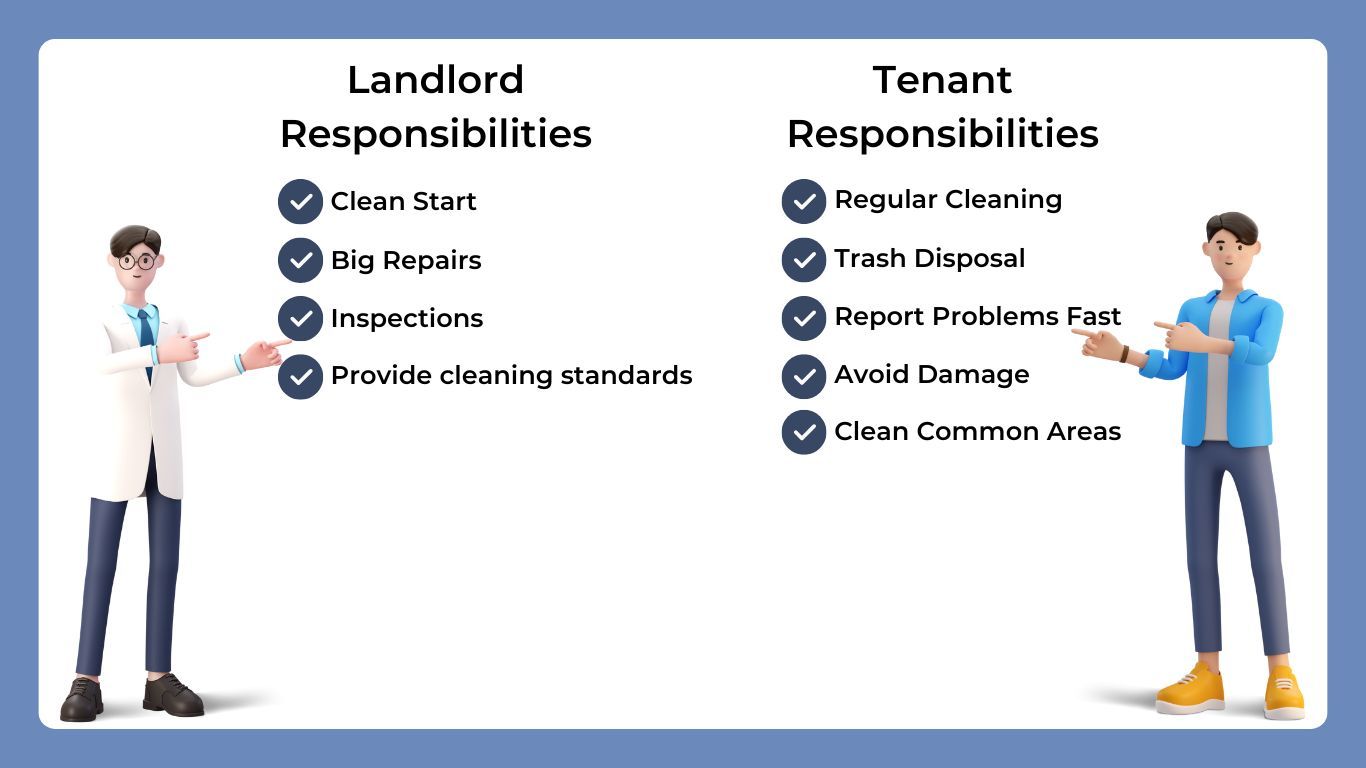So, you're renting a place? It's super important to know your cleaning duties Why? Because it helps keep things smooth with your landlord & avoids any trouble when it's time to move out. Ignoring these can lead to fights, fines, or even worse. By staying on top of cleaning, you protect your deposit and show respect for the place you’re living in.

Cleaning obligations mean keeping the rental property clean and livable all the time and when you leave. Your lease will usually spell these out. It can be different depending on what the landlord expects and the local rules.
You need to know what’s just normal wear and tear and what’s going too far. Normal wear and tear is just stuff getting old because it’s being used, which is fine. But if there’s big damage or it’s super dirty because you didn’t take care of it, that’s not okay.
Before you sign the lease, make sure to read & understand the cleaning stuff in there. These parts tell you exactly what cleaning you need to do while you're living there and when you move out.
Common things you'll find in lease agreements:
By knowing what’s spelled out in your lease about cleaning, you’ll avoid problems, keep things good with your landlord & have a better chance at getting your full deposit back!

By following these cleaning rules both tenants & landlords can get along better. Talking openly and respecting each other's roles will make living there much nicer for everyone!
When your lease ends, you've got to leave the rental looking nice and clean. If you don't, you might lose some of your security deposit. Or even get into a legal spat with your landlord. So, it's important to really focus on move-out cleaning.
Making a detailed cleaning checklist helps a lot. Include everything—from the kitchen and bathrooms to living areas and bedrooms. Don't miss spots like baseboards, light fixtures & appliances.
Feeling stressed about doing it all yourself? Think about hiring professional cleaners. Yes, it's extra money, but they know what they're doing. They’ve got the right tools and can make the place look perfect. And saves you time & prevents landlord arguments.
Before starting, take pictures or videos of the place. This can show how it looked before & after you cleaned, which can protect you from unfair deposit deductions.
Your security deposit is something you want back in full when you move out. But your cleaning affects whether you get all that money back or face cleaning costs.
Most places say your landlord can deduct cleaning costs from your deposit if the rental isn't clean enough. So, if you don’t meet the standards in your lease, they can hire cleaners & charge you.
Remember, what's “clean enough” can change from one landlord to another. Some are stricter than others. Check your lease for cleaning rules and talk to your landlord for any clarification before moving out.
To avoid problems and keep more of your deposit, leave the place as clean as when you moved in (or cleaner). Take before & after pictures or videos to show your efforts. Ask for a walk-through inspection with your landlord before leaving.
By following these tips and being proactive with move-out cleaning, you'll have a better chance of getting your full deposit back and keeping good terms with your landlord.
When it comes to cleaning tasks tenants have certain rights protected law. The lease agreement spells out what cleaning is needed, and landlords can't ask for too much. Here are some things to remember:
Reasonable Cleaning Standards:
Security Deposit Deductions:
If you think the cleaning charges or deposit deductions are unfair, you can dispute them.
Groups like local tenant unions or online resources can offer help in resolving problems related to cleaning duties and deposit deductions.
Dealing with cleaning tasks as a tenant might be tough, but knowing your rights helps. Talk openly with your landlord and stick to the lease to avoid issues. You can challenge unfair cleaning charges or deposit deductions.
Be proactive: document the property’s condition and seek help when needed. This protects your interests and ensures a smooth move-out. Knowing your tenant rights can save you stress and money.
Government Resources:
Tenant Union/Advocacy Groups:
Tenancy Deposit Protection Scheme Info:
Cleaning Companies/Services:
Legal Resources:
Rental Property Blogs/Forums:
